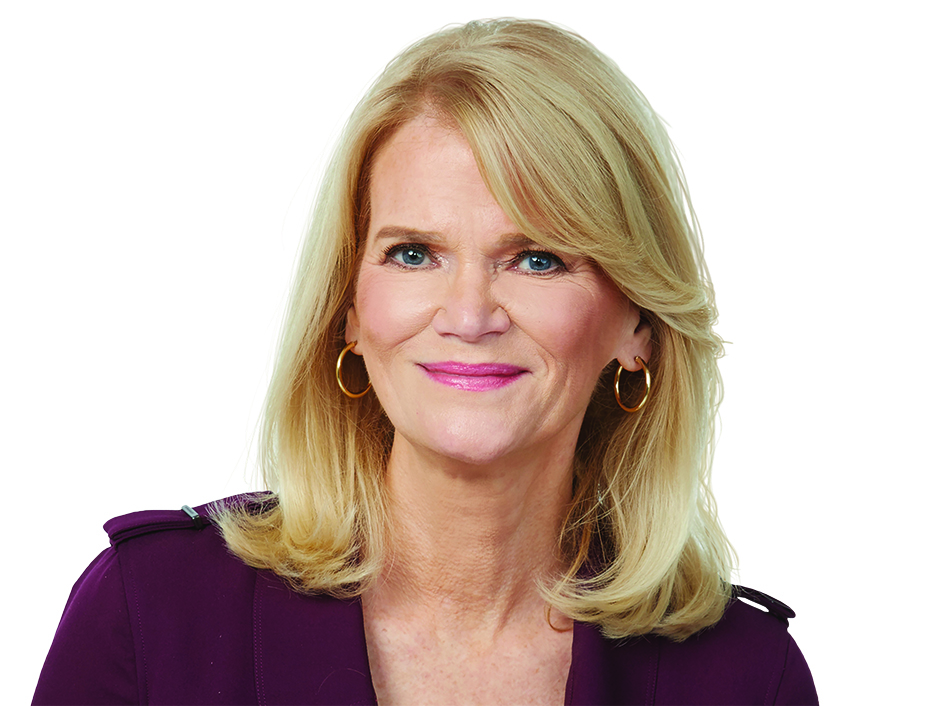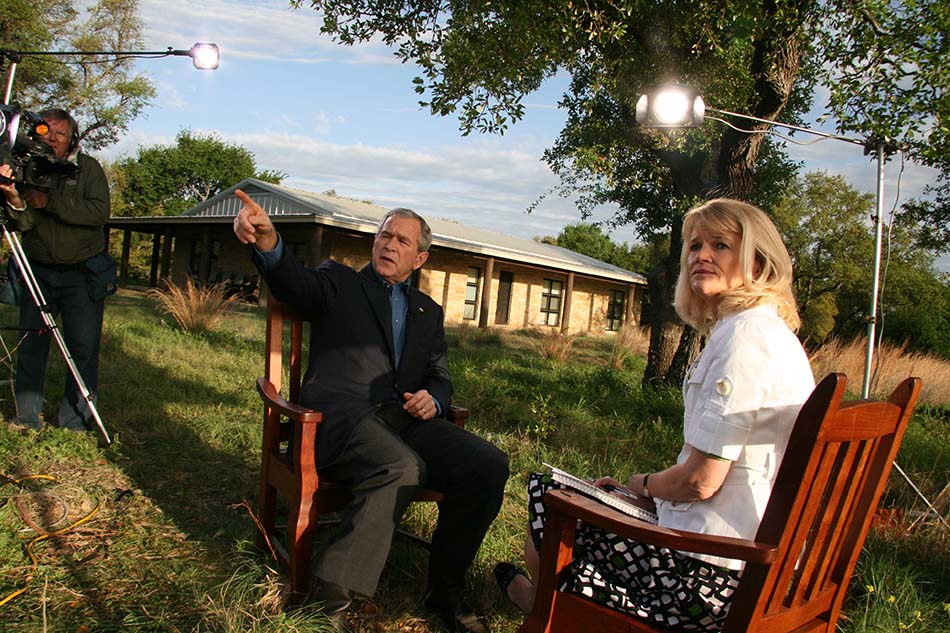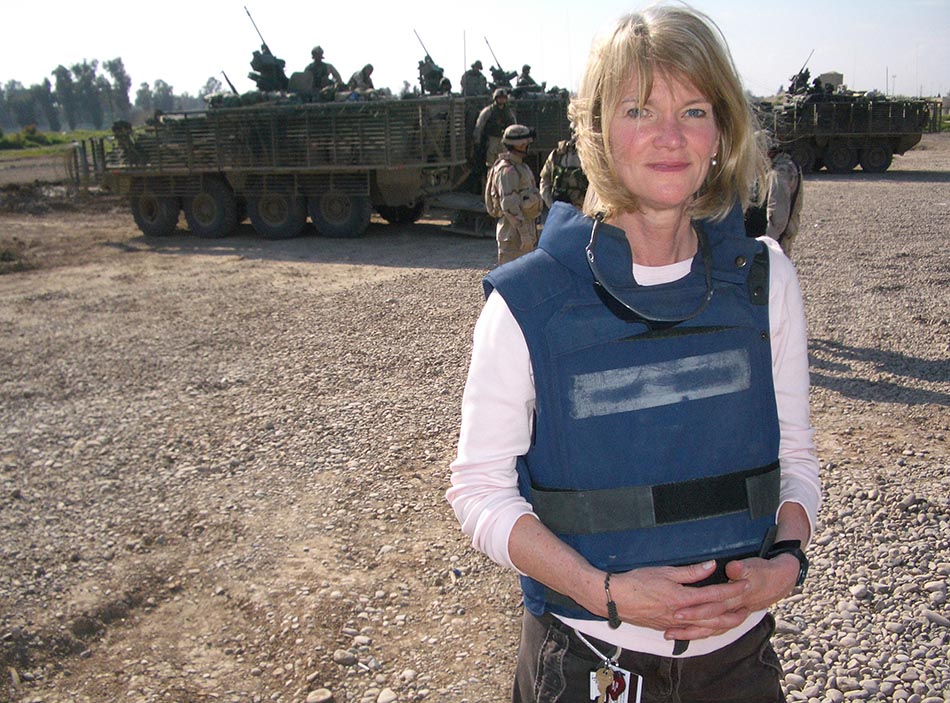Wonder Women of New York: After 40 Years, Martha Raddatz Stays in the Field
ABC News’ chief global affairs correspondent cleared the path for women covering wars

The smarter way to stay on top of the multichannel video marketplace. Sign up below.
You are now subscribed
Your newsletter sign-up was successful
When the Biden administration was withdrawing troops from Afghanistan last summer, ABC chief global affairs correspondent Martha Raddatz remained until the very end. She’d been shadowing U.S. Army Gen. Austin “Scott” Miller in those final days, and she hitched a ride out with him on the last helicopter out of Kabul.
Just because Raddatz, who is being honored alongside the 2022 Multichannel News Wonder Women class as this year‘s Woman of Influence, has risen to high heights in the ABC News organization — she also co-anchors This Week with George Stephanopoulos on Sundays — doesn’t mean she’s interested in spending any less time reporting the news from field assignments, even dangerous ones. If anything, her perch at the organization gives her more freedom to do the in-depth, complex stories about which she’s so passionate.
Also: ABC‘s Raddatz: News Media Are ‘Team of Rivals’
“I love what I do, I love it. I love it today as much as I loved it when I first started doing it,” said Raddatz, who has done everything at ABC News from covering the Middle East to moderating presidential debates to interviewing voters at a Trump rally. “It’s a disciplined curiosity — if you don’t remain curious, you aren’t going to love your job. That’s part of who I am. I love seeing the world and I have just met such fascinating, interesting people. It’s a gift. My job is a gift.”
Dax Tejera, executive producer of ABC’s This Week, called Raddatz “relentless in all the best ways. She’s a partner to a producer like myself. She’s constantly bringing ideas to the table. For someone at her level with her level of experience, her desire to go out and tell the story wherever that may be — whether that’s wearing her global affairs hat or going out into the country to talk to voters — she never tires of it, she loves it. That’s a unique trait for someone who wears so many different hats.”
Learned on the Job
Raddatz earned her journalism education on the job while working at a local TV station. She was one of the only local correspondents in the country to cover a global beat, traveling overseas to cover wars and conflicts. It was while she was working as chief correspondent at WCVB Boston that she began what became career-long coverage of the Middle East, with a particular focus on Iraq and Afghanistan.
“I dropped out of college because I got a job at a local TV station, I had no idea what I wanted to do,” Raddatz said. “I’ve never been a person who was going to do this, that and the other. I wanted to succeed in my field and be a good journalist — journalism was always first for me, and TV was second. I always remembered that I was here to be a journalist and not just to be on TV.”
The smarter way to stay on top of the multichannel video marketplace. Sign up below.

Outside of work, Raddatz has been married three times (her husband of 24 years is former NPR correspondent Tom Gjelten) and has raised two children, covering the news up to the very day she had her daughter, Greta Bradlee, in 1980. “I did two stories that day running around in a news van,” she said.
Her boss and coworkers told her she would not want to come back after she had kids, but she knew they were wrong. In fact, she returned to work just two weeks later.
As with all women who have engrossing careers and also have families, balance wasn’t really on the table. It was more about managing risk and staying in close communication with her kids about what she was doing.
“My family, without question, my children and my husband, are of primary importance to me and what I can contribute is an understanding of conflict,” she said. “Maybe the balance is letting your kids know why you do what you do. I don’t cover wars because it’s a cool thing to do or to say, ‘Aren’t I brave?’ I cover wars so I can let people know what the cost is, so people will understand it more. The more my kids understood it, the more they accepted it.”
Raddatz was raised by a single mom after her father passed away just shy of her third birthday.
“My mother always said she was born 20 years too early,” Raddatz said. “She worked as a secretary and she raised two little girls by herself with zero help. Seeing what my mom did and knowing that my mom felt held back because she was a woman — we talked about it all the time, probably a little too much. Somehow that seeped into me. I thought, ‘By God, I’m doing to do whatever I want and never let being a woman stop me.’ ”
Setting No Limits
That work ethos has framed Raddatz’s career as she’s covered fields of conflict all over the world. From WCVB, Raddatz went to NPR, where she was the Pentagon correspondent from 1993-98. She joined ABC News as the State Department correspondent in 1999 and moved to national security correspondent in 2003. She also served as the network’s chief White House correspondent during the Bush administration. She was named senior foreign affairs correspondent after President Barack Obama was elected in 2008.
“If there’s a major story in the world, she gets to go first if she wants to go and to stay longer if she wants to,” Byron Pitts, co-anchor of Nightline and chief national correspondent for ABC News, said. The two have worked together on and off since they were both correspondents at WCVB in 1989.
“When January 6 happened, Martha raised her hand like anybody in the D.C. bureau,” Pitts said. “One could make the argument that with her stature at this stage in her career, she could have offered context about that important story from her studio. But she wanted to be there in the mix-up. Some people in our business build their professional tan from studio lights. Others build their professional tan from the sun that shines around the world.”

Today, Raddatz says that while there are more women on the global-affairs beat, it can still be a challenging place for women, especially in countries where equality for women is not a priority.
Also: Martha Raddatz‘s ‘Long Road’ to Scripted Television
“I still find myself in corridors of power where there are not a lot of women,” she said. “I’m not talking about my business or ABC, I’m talking about the places I cover. While there are many incredibly talented war correspondents out there, they are still largely men. And early on, when I went in with ground troops, there weren’t a lot of women with me.”
Earning Role-Model Status
As a result, Raddatz has served as an inspiration for many up-and-coming female journalists.
“Martha is someone I have always looked up to,” Rachel Scott, ABC News congressional correspondent, said. “I looked up to her long before I had an opportunity to meet her. I remember watching her press world leaders in some of the world’s most dangerous areas and provide context and analysis.
“When I first moved down to D.C., I had a big lump in my stomach about meeting her,” Scott said. “It made me so nervous. When I finally did meet her, she stopped me in the hallway and said, ‘Rachel, it’s so good to have you here in the newsroom, you’re doing great work.’ Since then, I have no idea why I was so nervous about meeting her. She is one of the kindest people I have ever met.
“She’s a mentor to so many young women coming up behind her,” she added. “No matter how high she climbs, she never forgets to reach back and pull others up with her.”

The current challenges Raddatz and her cohorts face are the constant attacks on journalists by those who would prefer them to relay a different narrative.
“The whole idea of fake news and the idea that the press is the enemy of the people is horrifying,” Raddatz said. “We as journalists continue to do our jobs and tell the truth and call out lies. It’s at the heart of what we do. It’s not opinion, it’s trying to find the truth and calling out those who are not.”
In the end, Raddatz feels hopeful about the role of journalism and its place in American democracy.
“I am optimistic about the news,” she said. “I think in so many ways that the charges of fake news and that the press is the enemy of the people has just made journalists that much more hard-core. Do-or-die journalists are just doubling down and saying ‘this is what I was born to do and I’m going to do it better than I ever have.’ ”
Those hard-core journalists have Raddatz to thank for paving the way. ■
Contributing editor Paige Albiniak has been covering the business of television for more than 25 years. She is a longtime contributor to Next TV, Broadcasting + Cable and Multichannel News. She concurrently serves as editorial director for The Global Entertainment Marketing Academy of Arts & Sciences (G.E.M.A.). She has written for such publications as TVNewsCheck, The New York Post, Variety, CBS Watch and more. Albiniak was B+C’s Los Angeles bureau chief from September 2002 to 2004, and an associate editor covering Congress and lobbying for the magazine in Washington, D.C., from January 1997 - September 2002.

